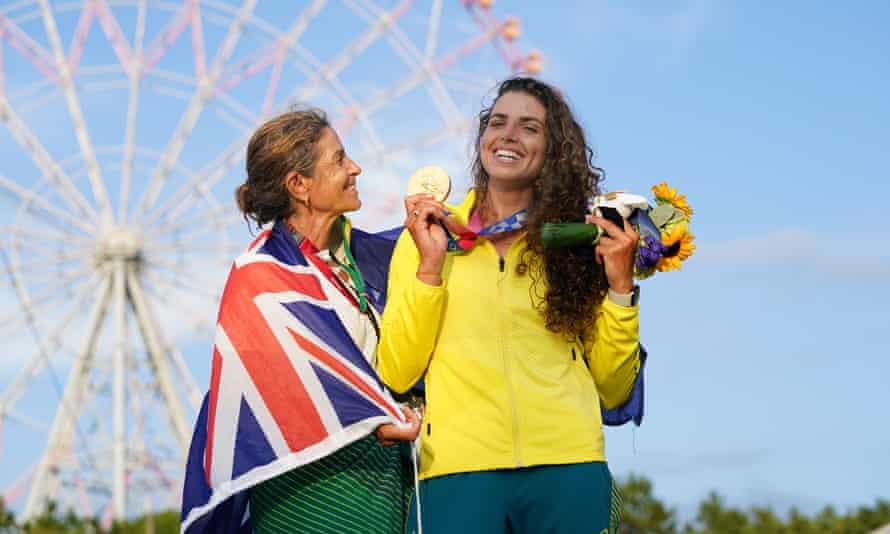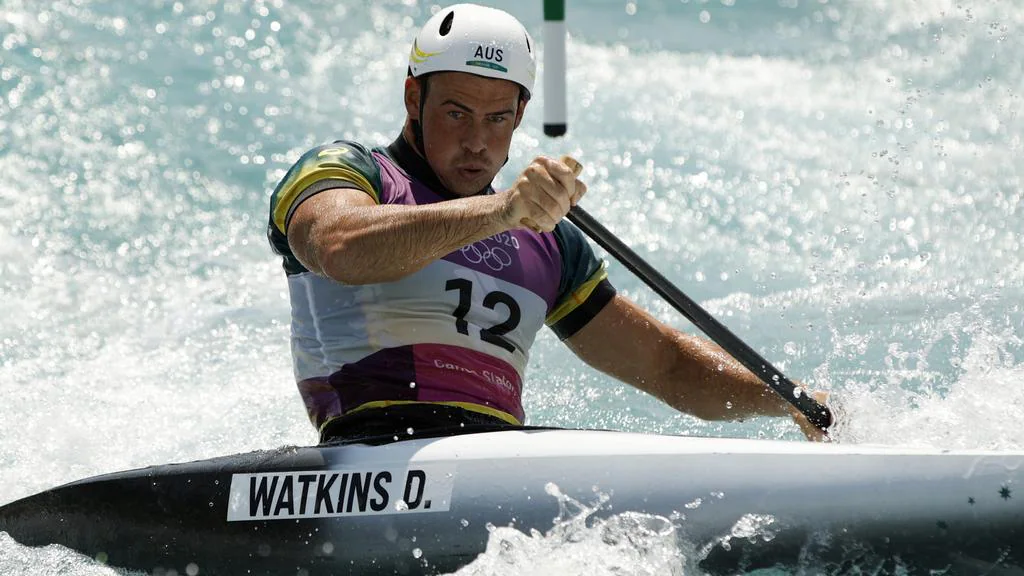Sometimes what stands out to me the most these days when I watch Olympic whitewater slalom on TV is not the perfect, flawless runs that secure victory, but the flawed, imperfect runs — even the disasters — that lead to disappointment.
That happened three nights ago, during the men’s C-1 final as I watched a young Australian paddler named Dan Watkins. It happened again as I watched his countrywoman, Jessica Fox, fall short in her third bid for Olympic gold in the women’s kayak event.
Watkins, second after semi-final runs, made it halfway down the course before he missed a move. Swept downstream, he had to fight his way back up the current, hemorrhaging time and any chance at a medal.
Fox entered the race as the prohibitive favorite, having dominated the semi-finals, a bronze and silver medalist at the past two Games, chasing the elusive gold. Even though she took a touch on an early gate on her finals run, she fought her way down the challenging course still holding a slim lead — even with her touch — into the last two gates. But then — unthinkably — she touched the second-to-last gate with her face. With four penalty seconds, she finished third.
But with both Watkins and Fox, what I found myself admiring was their reaction to the setbacks. Watkins instantly pivoted his boat, paddled hard back up-river, and made the gate — even as he knew he’d blown any shot at the medals.
Fox looked shattered at the finish line, but on shore she congratulated her competitors, carried herself gracefully at the awards ceremony, and posted classy, magnanimous comments on social media. She wrote about how successful she felt to have “fought really hard and gave it everything” and therefore would “cherish” her third Olympic medal, no matter the color.
She’s absolutely right: she should. Watkins too should be tremendously proud of his efforts. As I watched both athletes, I thought again of sportswriter Grantland Rice’s famous quote: “For when the One Great Scorer comes to mark against your name, He writes not that you won or lost, but how you played the game.”
Even though this quote is surely a cliché — the kind of thing your parents might tell you after a lost Little League game — it seems to me more and more true as time passes. One of the joys of getting older, I believe, is realizing that life is more about playing the long game than it is about peaking early. When you’re in high school, scoring the big goal or winning the big game can feel like all there is. Missing that shot or coming up short in the big moment makes you feel like your life is over. You missed your one chance at greatness. Olympic defeats, surely, must feel even more this way, like you’ve let down yourself and those who supported you.
Although I never raced in the Olympics, I had my share of losses, bad runs, and bad games, like everyone else. And when you’re 39 like I am, you look back in wonder at how much more there was to life than you thought when you were younger. The order starts to flip: The older I get, the smaller and smaller the individual results seem to me, and the more the things that once seemed like the tools needed to accomplish the goal start to seem more like the goal themselves.
What are these “tools”? They are the habits and the traits you pick up as you’re trying to be the best you can be.
I’m thinking first of the virtues of character: “How you played the game,” as Rice said. Sports teach us resilience, sportsmanship, dedication and hard work, passion and commitment; getting out and practicing even when it’s not glamorous or lucrative. It’s missing a move and sprinting back up for it, rather than giving up. It’s seeing things in the right perspective after the race and taking pride in your efforts no matter the result. Congratulating worthy competitors. Thanking the people who supported you.
I’m also thinking about the habits you learn in the pursuit of excellence. When you really go after something — something challenging — you learn the habits of mind needed for success: problem solving, analysis, close observation, how to hypothesize and test ideas, how to learn new skills quickly, how to stay organized, how to engage in honest self-reflection based on results, how to change your plan in light of new data, how to work with others to maximize your efforts.
I know the importance of these lessons because I learned them. Never more than a middling national-level racer at best, I nevertheless crossed that final finish line at the Olympic Trials thirteen years ago with a blueprint for the way I have lived the rest of my life. Like a lot of athletes, I found it a little hard to know just what to do next. But within a year I returned to grad school and trained to be a teacher — and I realized canoeing had given me a map for what I wanted to do, and for how to succeed at doing it.
Yearly training plans for canoe races became yearly unit plans for teaching, broken down into weekly and then daily unit plans, constructed with goals and objectives, formative checks for how my students were doing, and larger summative exams at the end, all just as I’d learned to do in canoeing. Moving the gates on the Feeder Canal to isolate and practice a specific skill in the boat became me designing specific assignments to isolate and target specific skills for my students to work on. Planning my year backwards from the Olympic Trials turned into planning my year backwards from the last day of school and the final exam.
I found coworkers and colleagues of all types, just as dedicated and enthusiastic in pursuing their craft as my competitors and I had once been on the river. Our “shop talk” today — in the hallways before school, lingering in each other’s classrooms between periods — is no different in its zest, its pursuit of best methods, its war stories, or its mixture of collegiality, competitiveness, and friendly critique, from the conversations I had on the banks of Dickerson or Charlotte or in eddies on the Blackwater or Green, or sitting on the tailgate of a truck drinking beer at the takeout. It’s all there — all the same elements of the pursuit of excellence. (The only difference of course is that now I’m getting paid for it . . . and actually making a positive contribution to my community!)
Canoe racing taught me all of those skills, so perhaps that is why I see the final results differently now. I am thirteen years removed from my last big race, and about a decade removed from any serious river-running — yet the lessons are all still with me each day even though I am driving to work and not to the river.
When you’re an athlete in your twenties, it’s hard to imagine how much more living there is beyond sport — but there’s a lot. And if you’re able to keep the big picture in mind when you cross the finish line — and especially if you’ve prepared well, given the pursuit everything you have — then finishing fifth instead of first may sting, but in the end, I guarantee you that if you live your life with the same passion after the race, the race result itself will start to see pretty small. One day you’ll be proud of that third or fifth or twelfth place finish — you’ll “cherish” that bronze medal, in Jessica Fox’s words — because you’ve picked up a quite lot more along the way than you could have known.
So it turns out our parents were right: it is about how you play the game. And it’s about how you prepare for the game, who you do it with, and what you take away from that pursuit.
Postscript: Just after I wrote this, Jessica Fox rebounded from her third place finish in kayak to win gold in the inaugural Olympic women’s C-1 race. Much deserved!!

